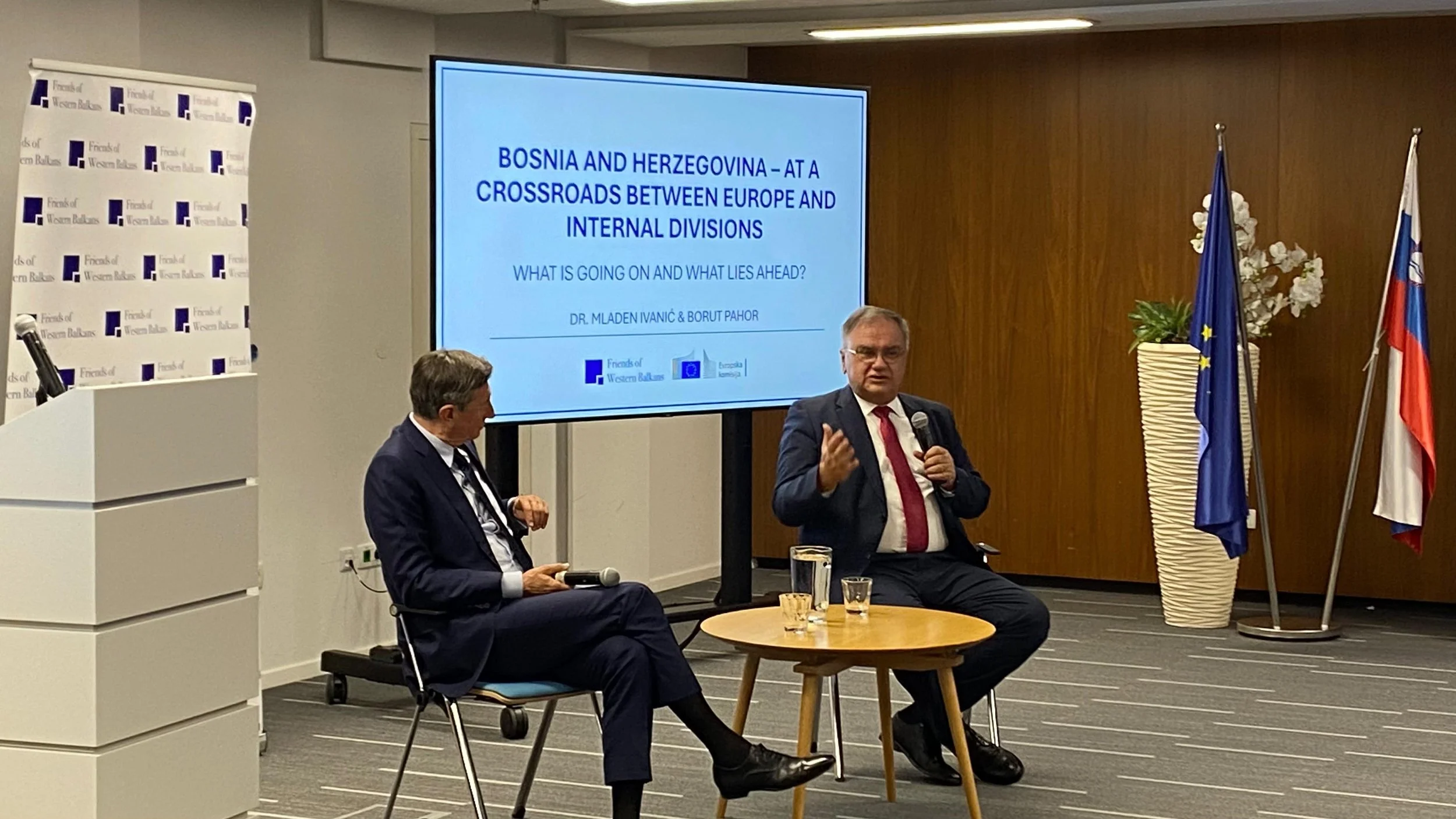FoWB hosts lecture by Dr. Mladen Ivanić: “Bosnia and Herzegovina – Between Europe and Internal Divisions”
Zavod Prijatelji Zahodnega Balkana (FoWB) je včeraj pozno popoldne v prostorih Predstavništva Evropske komisije v Sloveniji gostil predavanje uglednega bosanskega politika dr. Mladena Ivanića z naslovom »Bosna in Hercegovina – na razpotju med Evropo in notranjimi delitvami«. Dr. Ivanić je nekdanji predsednik in član predsedstva BiH, nekdanji zunanji minister BiH in nekdanji predsednik Vlade Republike Srpske. Dogodek je potekal na povabilo bivšega predsednika republike Boruta Pahorja, ustanovitelja in direktorja Zavoda FoWB, ki je imel uvodni nagovor ter nato vodil pogovor z gostom.
V svojem nastopu je dr. Ivanić spregovoril o trenutnem političnem stanju v Bosni in Hercegovini, institucionalnih blokadah ter izzivih delitve oblasti med entitetami. Poudaril je pomen dialoga, stabilnosti in mednarodne angažiranosti pri reševanju odprtih vprašanj.
Ivanić je med drugim dejal, da so že »vse zahtevne reforme za njimi in, da pot v Evropsko unijo ne bi smela biti več dolga«. Izpostavil je, da ga pri tem nikdar niso motili vstopni pogoji, ki so bili enaki za vse države kandidatke, temveč je nasprotoval tistim, ki so bili ustvarjeni posebno za Bosno in Hercegovino. Ivanić verjame, da obstoj instituta Visokega predstavnika mednarodne skupnosti v Bosni in Hercegovini ovira napredek skupnosti, ker »politiki vsake izmed entitet verjamejo, da je njihova prva naloga visokega predstavnika najprej podučiti o svojih pravicah«. »Menim, da bi zaprtje pisarne visokega predstavnika pomenilo to, da bi politiki začeli razmišljati o svojih rešitvah in ustvarjati dogovore za ljudi,« je še poudaril in hkrati opozoril, da današnji politiki »ne želijo voditi procesa, temveč želijo biti vodeni s strani javnega mnenja«.
Borut Pahor je v uvodu izpostavil pomen tesnega sodelovanja med državami Zahodnega Balkana in Evropsko unijo ter doslednega ohranjanja politike širitve kot geostrateške naložbe v mir in stabilnost regije. Bivši predsednik Pahor se je ob tem vprašal ali je to (status quo) lahko vzdržna situacija – glede na geopolitične razmere.
Dogodek je pritegnil številne predstavnike diplomatskega zbora, raziskovalce, študente in strokovno javnost, kar potrjuje veliko zanimanje slovenske javnosti za razmere v Bosni in Hercegovini ter širše na Zahodnem Balkanu. FoWB s tem nadaljuje svoje poslanstvo spodbujanja dialoga, povezovanja in izmenjave pogledov med ključnimi akterji v regiji.
»Nisem pesimist, kot tudi ne naivni optimist. Mlade generacije lahko ustvarijo nekaj novega, toda mnogi so še danes zaznamovani z vojno. V Daytonu pa ni ne zmagovalca in ne poraženca. Potrebujemo čas,« je svoje misli o prihodnosti in novih generacijah Bosne in Hercegovine strnil Ivanić.
The Friends of Western Balkans Institute (FoWB) yesterday evening hosted a lecture by distinguished Bosnian politician Dr. Mladen Ivanić, titled “Bosnia and Herzegovina – Between Europe and Internal Divisions.” The event took place at the Representation of the European Commission in Slovenia. Dr. Ivanić, a former Chairman and Member of the Presidency of Bosnia and Herzegovina, former Minister of Foreign Affairs, and former Prime Minister of Republika Srpska, spoke at the invitation of former President of the Republic of Slovenia Borut Pahor, founder and director of FoWB, who delivered the opening remarks and moderated the discussion.
In his address, Dr. Ivanić discussed the current political situation in Bosnia and Herzegovina, institutional blockages, and the challenges of power-sharing between entities. He emphasized the importance of dialogue, stability, and international engagement in resolving outstanding issues.
He noted that “all major reforms are already behind us, and the path to the European Union should no longer be a long one.” Ivanić stressed that he had never been opposed to the general accession criteria, which were the same for all candidate countries, but to those created specifically for Bosnia and Herzegovina. He also expressed the belief that the continued existence of the Office of the High Representative (OHR) hinders progress in the country because “politicians from each entity believe their main task is to teach the High Representative about their rights.”
“I believe that closing the Office of the High Representative would encourage politicians to start thinking about their own solutions and to create agreements for the people,” Ivanić said, warning that today’s political leaders “do not want to lead the process but rather be led by public opinion.”
In his opening remarks, Borut Pahor emphasized the importance of close cooperation between the Western Balkan countries and the European Union, and the consistent pursuit of enlargement policy as a geostrategic investment in the region’s peace and stability. He questioned whether the current status quo can remain sustainable in the present geopolitical context.
The event attracted numerous members of the diplomatic corps, researchers, students, and professionals, reflecting Slovenia’s strong public interest in developments in Bosnia and Herzegovina and across the Western Balkans. With this event, FoWB continues its mission of promoting dialogue, connectivity, and the exchange of perspectives among key regional stakeholders.
“I am not a pessimist, but neither a naive optimist. The younger generations can create something new, yet many are still marked by the war. In Dayton, there were neither winners nor losers. What we need is time,” Ivanić concluded.



